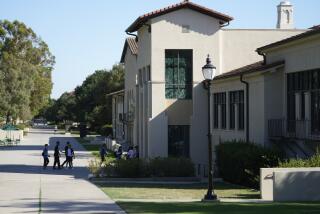Orange County Firms Reject Divestment : Some Claim That Their Presence Helps Nonwhite South Africans
- Share via
Despite the broadening exodus of American corporations from the troubled South African market, most big Orange County-based companies already doing business there say they intend to stay.
According to the Investor Responsibility Research Center, a nonprofit research group that monitors corporate trends, Smith International of Newport Beach is the only Orange County-based corporation to have closed or sold South African operations since January, 1984. Smith officials were not available Friday to explain the extent of the company’s prior operations there or why they were ended. Smith is operating under Chapter 11 of the federal bankruptcy code.
The remaining local companies differ in their approach to dealing with South Africa’s social ills and its controversial policy of Apartheid.
Sells Its Drugs
ICN Pharmaceuticals of Costa Mesa sells its drugs in South Africa through a network of agents, a practice chairman Milan Panic said the company has no intention of changing. “We’re very much concerned about South Africa’s policies but the country gets more attention than it deserves,” Panic said.
Panic, who fled Yugoslavia decades ago, argued that “plenty of countries have policies that are just as bad as South Africa’s,” particularly Communist countries.
Similarly, Wynn’s International Inc. does not plan to stop doing business in South Africa. In fact, stockholders of the Fullerton-based auto accessories maker in March overwhelmingly defeated a proposal to sign and abide by the Sullivan Principles. The principles call for equal treatment of all employees regardless of race, and a commitment to improve the careers and life styles of nonwhite workers.
Proposal Drew Fire
The proposal drew fire from Wynn’s management, which claimed that its 70 employees in South Africa were already treated equally. Wynn’s management argued that it had only limited ability to “improve the quality of its employees’ lives outside of the work environment” and did not want a third party from the Sullivan organization to monitor its activities.
At the Fluor Corp., shareholders in March voted down a proposal that the Irvine-based oil service company terminate its business with the nationally owned South African Coal, Oil and Gas Corp. until the government of South Africa abandons apartheid.
Fluor Chairman David Tappan said that while Fluor considers apartheid to be “repugnant, we feel that companies like ours (by staying in South Africa) can provide a very positive force for peaceful and positive change.”
Social Benefits
Under the Sullivan Principles, to which Fluor subscribes, Fluor says it provides a broad range of social benefits to black South Africans, including scholarships, financial assistance to black schools and universities and job training.
Also, Fluor says it gives employment to native blacks that it trains. According to Fluor spokesman Rick Maslin, 15 of the 150 workers in the corporation’s South African engineering office are nonwhite.
Orange-based Baker International continues to provide mining services and equipment to South African companies although it has taken a stance against apartheid. Last November, Baker signed the Sullivan Principles to promote the advancement of blacks in South African society.
At Baker’s shareholders meeting in January, Baker Chairman E. H. Clark Jr. said the company is fighting apartheid by trying to persuade political representatives in South Africa, and by helping to finance the efforts of the South African Chamber of Commerce. He said that although Baker would remove its operations from South Africa if its shareholders demanded it, company officials would not recommend such action.
More to Read
Inside the business of entertainment
The Wide Shot brings you news, analysis and insights on everything from streaming wars to production — and what it all means for the future.
You may occasionally receive promotional content from the Los Angeles Times.










